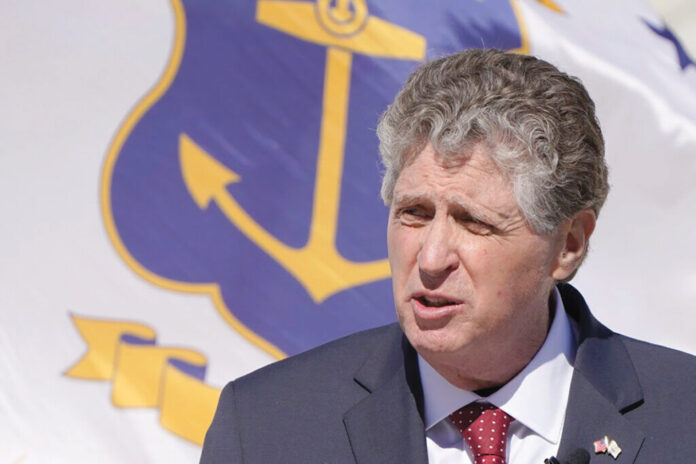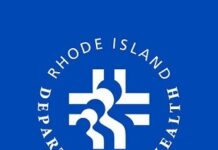
PROVIDENCE – Gov. Daniel J. McKee announced Rhode Island is lifting the indoor masking and proof of vaccination mandate on Feb. 11 after it has been imposed on businesses and other venues throughout the state since mid-December.
McKee also said the state’s in-school mask mandate will be coming to an end on March 4, following suit with several other states such as Connecticut, Massachusetts and New Jersey that already announced they are discarding similar policies, after a steep decline in the COVID-19 infection rate that came in the wake of an omicron-fueled surge of cases in early January.
McKee said local school districts and communities will be able to make their own decisions on mandatory masking after March 4.
These decisions by McKee come as new cases of COVID-19 in Rhode Island within a seven-day time frame reached 411 per 100,000 persons on Tuesday, down from a peak of 3,464 on Jan. 9, according to data from the R.I. Department of Health. COVID-19 hospitalizations are also down from their highest point of 611 on Jan. 17, to 279 as of Tuesday this week, the health department reported.
“We’ve made considerable progress against COVID-19 and the recent surge,” McKee said on Wednesday. “We’re in a much better place than we were in early January. This is a result of Rhode Islanders stepping up to do the right thing, in terms of vaccination and testing. … We have to learn how to manage COVID as we move from a pandemic to an endemic phase of the virus.”
In addition to his announcement on the masking mandates, McKee said he’s planning to end indemnity protections for Rhode Island hospitals, which he provided through an executive order based on the staffing crisis. The indemnity protections made it so hospitals could not be sued by patients if a gap in staffing led to inadequate care. McKee said he’ll let the legal protections expire on Feb. 14.
“Our anticipation is that the workforce is going to come back to work, and they’ll continue to grow their staff as they need to,” McKee said about the hospitals. “We’ve let the hospital association know that I won’t be renewing that indemnity clause.”
And while businesses and venues for assembly will no longer be mandated to require guests to either wear a mask or show proof of vaccination, McKee pointed out that federal requirements will still mandate masking on public transportation and school buses.
McKee said a requirement for youth athletes to wear masks while in competition will likely end with the end of the school mask mandate on March 4.
The Rhode Island school mask mandate was originally put in place through an executive order that McKee announced in August last year, citing the rise of the delta variant of COVID-19 at the time. That came after most school districts in the state had already enacted their own mask mandates before the end of summer break, although there was some resistance, including an initial refusal by the town of Glocester.
R.I. House Republicans have called on the state to eliminate the school mask mandate much sooner, with plans to submit a floor amendment on Thursday aimed at ending the requirements on Feb. 14. In a statement, the Republican lawmakers claimed that masking in schools is ineffective and hurts the “social and academic development of our children.”
Asked about how local school districts will proceed with their options to enforce masking policies of their own going forward, R.I. Education Commissioner Angélica Infante-Green said some school districts have more work to do when it comes to vaccinating students. She pointed out that the COVID-19 vaccination rate among eligible children in Providence is just 32% and in Central Falls it’s 31%, compared with 89.3% of adults in Rhode Island who have completed their primary series of COVID-19 shots.
“We have to do better,” Infante-Green said. “Parents need to get their kids vaccinated.”
The National Education Association Rhode Island issued a statement on Wednesday afternoon calling for McKee to provide guidelines for local school districts on how they should approach mask policies going forward. The organization also urged McKee to reimpose the statewide mask mandate if there’s another surge in cases.
“We urge Gov. McKee to continue analyzing COVID data with his team of public health experts and to do whatever necessary to protect the health and safety of our students and staff – including reimposing a mask mandate if data trends change,” said National Education Association Rhode Island, a labor group that represents 12,000 teachers, education support professionals and college faculty. “We also urge Gov. McKee, [Interim Director of the R.I. Department of Health Dr. James McDonald] and Commissioner Infante-Green to provide clear guidelines to our school districts, as they will be making decisions regarding in-school masking based on local data.”
McKee made clear that businesses and other organizations that want to keep their own masking or proof-of-vaccination policies in place can do so. Dale J. Venturini, CEO and president of the Rhode Island Hospitality Association, released a statement after McKee’s announcement about how it’s important to support businesses that will continue to require masking or proof of vaccination.
“The hospitality industry continues to work hard to provide guests with the best experience possible, including keeping patrons and staff safe,” Venturini said. “While the state mandates may be dropped, we recognize that business owners may choose to require proof of vaccination and/or mask-wearing in their own businesses and we ask that those decisions are respected.”
The Ocean State Coalition, another Rhode Island business group, applauded McKee for ending the state’s indoor masking/proof-of-vaccination mandate. The group was calling for the mandates to end ahead of the Super Bowl weekend and Valentine’s Day, instead of letting them expire three days later. The mandates, which were extended several times since they were announced in mid-December, were originally set to expire on Feb. 14.
“The message is clear that consumers can once again feel confident to shop and dine local, while also giving everyone their choice when it comes to masking,” said Ocean State Coalition co-founders Chris Parisi and Rick Simone in a joint statement. “We thank the governor for listening to the small-business community and look forward to continuing the efforts to bring Rhode Island back stronger than ever.”
In a press conference held earlier on Wednesday, Mass. Gov. Charlie Baker announced that his state’s school mask mandate policy is ending on Feb. 28. Baker pointed to the wide availability of the COVID-19 vaccine for children and ample access to testing as reasons for ending the state’s school mask mandate. Baker also said children are at a relatively low risk of serious illness if they become infected with COVID-19.
“Everyone now has the tools and the knowledge to stay safe in respect to COVID,” Baker said. “Given the extremely low risk for young people, the widespread availability and the proven effectiveness of vaccines, and the distribution of accurate test protocols and tests, it’s time to give our kids a sense of normalcy and lift the mask mandate on a statewide basis for schools.”
(UPDATES: Adds comment from McKee about ending indemnity protections for Rhode Island hospitals and the youth athlete mask requirement on March 4.)
Marc Larocque is a PBN staff writer. Contact him at Larocque@PBN.com. You may also follow him on Twitter @LaRockPBN.













Booyah!